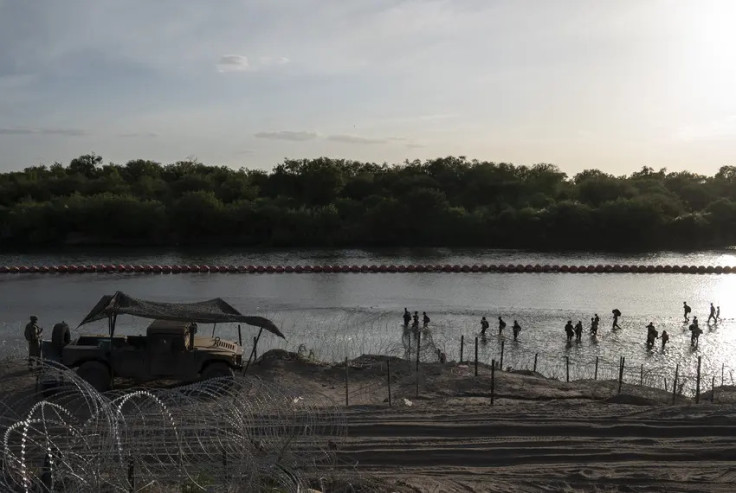
A federal judge on Wednesday ruled that Texas must remove its floating barrier from the Rio Grande, a victory for the federal government after it sued the state for placing the barrier in an international waterway.
"Governor Abbott announced that he was not 'asking for permission' for Operation Lone Star, the anti-immigration program under which Texas constructed the floating barrier. Unfortunately for Texas, permission is exactly what federal law requires before installing obstructions in the nation's navigable waters," Federal District Judge David A. Ezra wrote in his order issuing a preliminary injunction to remove the barrier.
Gov. Greg Abbott's office immediately appealed Ezra's ruling to the U.S. Court of Appeals for the Fifth Circuit, saying in a statement it "is prepared to take this fight all the way to the U.S. Supreme Court."
"Today's court decision merely prolongs President Biden's willful refusal to acknowledge that Texas is rightfully stepping up to do the job that he should have been doing all along," the statement says.
"We will continue to utilize every strategy to secure the border, including deploying Texas National Guard soldiers and Department of Public Safety troopers and installing strategic barriers."
The 1,000-foot-long string of buoys, separated by serrated saw blades and supporting a submerged mesh net, has floated in the middle of the river next to Eagle Pass since July, sparking protests from the Mexican government and migrant advocates alike.
It's the latest effort by Abbott to deter migrants from crossing the border under the umbrella of Operation Lone Star, which he launched in March 2021 shortly after President Joe Biden took office. Abbott has deployed state troopers and National Guard members to the U.S.-Mexico border and has lined the river with everything from shipping containers to rows of concertina wire.
Meanwhile the federal government, which has primary jurisdiction over immigration laws, has largely avoided a political confrontation with the governor.
That changed on July 24 when the U.S. Justice Department sued Texas in an Austin federal court, arguing that the floating barrier was installed without required federal authorization and threatens relations with Mexico.
The Justice Department said in its lawsuit that Texas didn't receive the necessary authorization for the structure from the U.S. Army Corps of Engineers and that the barrier obstructs navigation on the Rio Grande.
Lawyers for the state countered that the barrier isn't a structure that requires authorization, and that it notified the International Boundary Water Commission — the binational body that regulates the Rio Grande — before installing the barrier.
"The buoys are a symbol of the hate-filled and inhumane policies Gov. Abbott has embraced as he continues to wage war on immigrants seeking to make better lives for themselves, as millions of other immigrants have done for hundreds of years in this country," Carolina Canizales, a senior Texas strategist with the nonprofit Immigrant Legal Resource Center, said in a statement. "This stretch of the beautiful Rio Grande River has been turned into a militarized zone and has wreaked havoc in the peaceful community of Eagle Pass."
In his order, Ezra said that the Justice Department's lawsuit would likely succeed on the grounds that the barriers were constructed on navigable water, which requires a permit from the U.S. Army Corps of Engineers.
Ezra ordered Texas to remove the floating barrier by Sept. 15, one day before Mexican Independence Day.
*William Melhado and Uriel J. García are reporters for The Texas Tribune
This article was originally published on The Texas Tribune.
© 2025 Latin Times. All rights reserved. Do not reproduce without permission.



